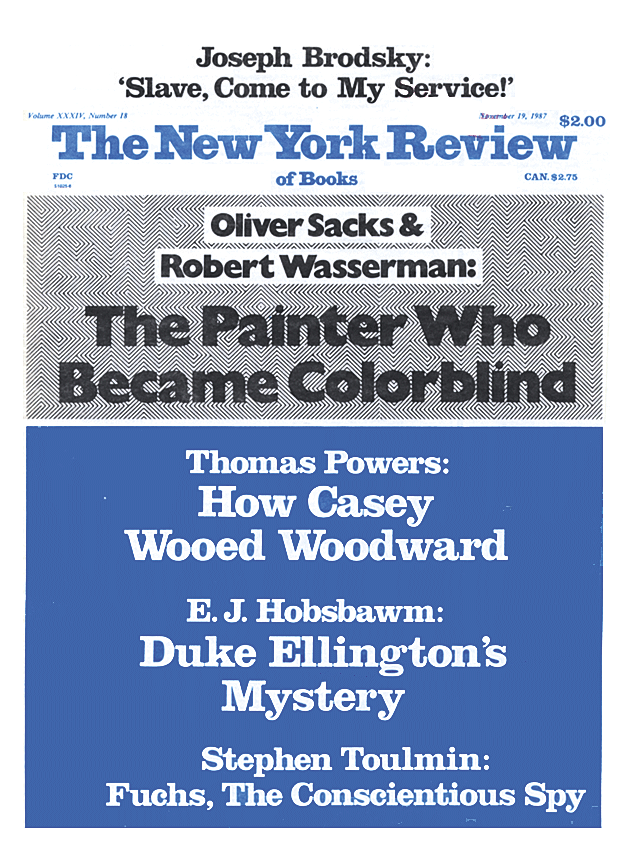By the time the FBI caught up with him, John Walker had spent seventeen years spying for the Soviet Union. He had earned something like $750,000, a $44,000 annual average.
Jerry Whitworth, Walker’s most serviceable recruit, made $332,000 in ten years. Zestful spy though he had been when the spirit moved him, Whitworth slipped more and more into infirmity of purpose. It had begun to occur to Walker that no bond ever so securely endures as the tie to one’s own blood, and he set out to seed the armed services with his children.
He persuaded his daughter, Laura, to join the Army, where she turned out to be ill-suited both to the soldier’s and her father’s trade. The initial results were better with his son, Mike, who was stealing classified documents on his first day of duty on the carrier Nimitz.
Two months later, Mike Walker was carried off to prison from a ship whose captain had judged him “hard-charging, completely dependable,” and worthy of the 4.0 evaluation that is the Navy’s highest for a sailor. He had lived up to a family tradition: John Walker, his brother Arthur, Jerry Whitworth, and now Mike had all been rated 4.0 by their Navy commanders.
I Pledge Allegiance is Howard Blum’s study of these Walkers and the admiration they evoked in their country’s military and the Soviet Union’s intelligence services. Blum is at once an imaginative and a thoroughly scrupulous reporter: “hard-charging, completely dependable” would be an excellent description and, in this instance, deserved.
He seems deliberately to have chosen to tell his story in a slangy, trashy tone that, while altogether suited to its protagonist’s own style, does not quite measure up to the full proportions of a tale so Dreiserian. The prose gives us all the jagged, hysterical pitch of the Walker family, but somehow we are left feeling a trifle cheated of its soul-sickness.
It is never easy for us to think of betrayal of one’s country as the peculiarly personal decision it most often is, and we have only to look at a career like Walker’s to give way to the itch to trace it to some fancied spirit of the age. A generation or so ago, the spies who served the Soviet Union were uniformly sympathizers with the Russian Revolution, and an explanation that had its fashion in those days was that in the Thirties everyone was a Communist and, we may presume, joined the young Richard Nixon and John F. Kennedy in Lyndon Johnson’s Marxist study class.
That temptation to mistake the individual for the general is even more perilously beguiling in the Walker case. John Walker’s politics were, so far as coherent, John Birchite. He was a mercenary drawn to employment by exigencies of circumstance. The snack bar that incarnated his dreams for retirement was failing; the IRS was aggressing; his less and less frequent stoppings-off at home were made hideous by the revilements of his wife and the turmoils of his children.
His agonies were relieved only in the on-duty hours when he could savor his closeness to great secrets as crew chief of the Atlantic submarine fleet’s communications center, and in the by-no-means shorter off-duty hours when he was drinking with his mates. These two solaces joined to bear their fruit late one happy hour when another sailor wondered what the Russians might pay for a cipher-key list. So John Walker stole one and drove to Washington and rang the bell of the Russian embassy to find out.
It would be much later when his Soviet control agent commended his services to world peace. We have no way of knowing what interior laughter may have been stirred in John Walker with this citation; but he held his tongue and took his cash and had the gratification of being informed that “you have been rewarded with the rank of admiral in the Navy of the Union of Soviet Socialist Republics,” a grander distinction than ever seems to have come the way of authentic deserters like Burgess and Philby. The Soviets may have discarded or forgotten many articles of the Marxist creed, but they cling to the old faith in economic determinism as the director of a man’s choices and his fates.
We cannot think this family typically American unless we take for fact the suspicion that to be desperate is the typically American experience. There is no figure in Blum’s narrative, even one comparatively innocent, who cannot remember an appalling childhood. If a boy, he was deserted by a father who threw a whiskey bottle on his way out. If a girl, she was deserted, too, and acquired a stepfather who molested her.
You served in a Navy that enslaved you to machines; you got your 4.0 rating and took retirement and opened a bar, which flopped and left you with no way to recover except to peddle what secrets you had learned as a robotomized sailor.
Advertisement
These are people who, in time of trouble, know no place to turn except to fortune tellers and the Christian Broadcasting Network. Life has left them helpless to do aught but harm, and the awful thought is not that they are all of us but that there are too many of them to bear thinking about.
Blum leaves them with John Walker in jail striving to reunite the family for a $5-million television deal. He would show once again that his children have a better father than he himself had had, and the fair-minded owe it to him to surmise that he was indeed as good a father as he knew how to be.
This Issue
November 19, 1987


